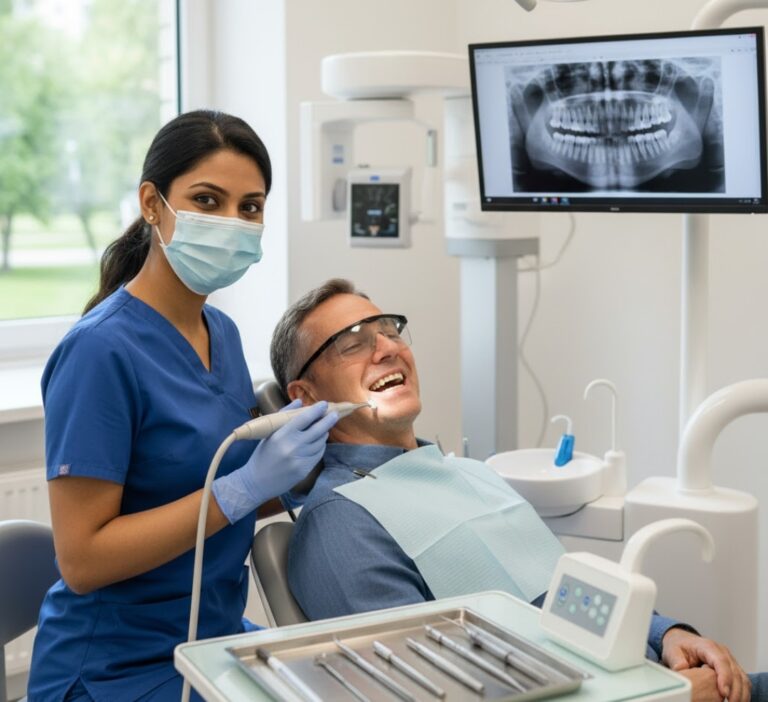Regular dental care remains the cornerstone of a healthy, confident smile. Many people underestimate the value of routine dental cleanings, exams, and X-rays in preventing oral health issues before they become costly or painful problems. With knowledge and preparation, your dental visits can provide lasting benefits and peace of mind for you and your family. For expert dental coverage, visit https://www1.deltadentalins.com/individuals-and-families.html to explore your insurance options.
With a proactive approach to oral health, every dental appointment is an opportunity to clean, assess, and protect your teeth and gums. Understanding how each element of a checkup works—and how to prepare—ensures you receive optimal care and guidance from your dental provider.
Many dental problems, such as cavities or gum inflammation, may not initially have visible symptoms. By attending regular dental appointments, you allow professionals to catch issues early, making treatment easier and less invasive. Embracing preventive care helps avoid emergency procedures and supports your long-term health.
It’s also worth noting that excellent oral health can influence your overall wellness. Dental health is connected to heart health, diabetes management, and even early disease detection, as highlighted by major health organizations and dental experts.
Understanding the Components of a Dental Visit
Every routine dental appointment consists of interconnected essential services contributing to immediate and long-term health. Here’s what you can expect at a typical visit:
- Professional Cleaning: A dental hygienist uses specialized instruments to remove plaque and tartar build-up that brushing and flossing often miss. This helps in the proactive prevention of cavities and gum disease.
- Comprehensive Exam: Your dentist will thoroughly assess your teeth, gums, and mouth for any signs of decay, gum infections, or other abnormalities. Prompt identification of problems allows for early, more effective treatment.
- Dental X-Rays: These imaging tools give dentists a deeper look into the areas beneath your gum line and within your teeth or jaw. X-rays can spot otherwise invisible problems, such as minor cavities, impacted teeth, or structural issues.
Preparing for Your Dental Appointment
Prior planning can set the stage for a successful dental visit by saving time and ensuring nothing important is overlooked. Here are simple ways to prepare:
- Update Your Medical History: Always inform your dental team about recent health changes or new medications. Some conditions or drugs can impact your dental health or influence treatment options.
- Practice Good Oral Hygiene: Brush and floss regularly before your appointment. This makes professional cleaning more effective and signals your commitment to oral health.
- List Your Concerns: Write down any symptoms, sensitivities, or questions you want to discuss. Effective communication enables your dentist to tailor care to your needs.
Maximizing the Benefits of Dental Cleanings
Dental cleanings provide much more than just cosmetic benefits. Removing stubborn plaque and tartar helps stop gum disease at its earliest stages. Professional cleanings brighten your smile by eliminating surface stains and freshen your breath, which is important for personal confidence and overall well-being.
- Prevention of Gum Disease: Reducing plaque buildup lowers your risk of gingivitis and, left untreated, periodontitis, which is linked to tooth loss and other systemic concerns.
- Early Detection: Your dental team can spot trouble areas before they escalate, minimizing the risk of needing complex treatments in the future.
- Improved Smile: Removing stains and polishing teeth creates a radiant, healthy appearance.
The Role of Dental Exams in Oral Health
Routine dental exams allow your provider to look for subtle or early indicators of problems. They systematically assess three key areas:
- Tooth Decay: Spotting cavities or weakened enamel ensures timely intervention with less-invasive procedures.
- Gum Health: Dentists inspect your gums for swelling, redness, or other warning signs of disease, which is crucial for preserving teeth and bone health.
- Oral Cancer Screening: The exam includes a check for unusual lesions, lumps, or persistent sores. According to the Mayo Clinic, early detection of oral cancer significantly increases successful treatment outcomes.
Understanding the Importance of Dental X-Rays
Dental X-rays are an essential diagnostic resource, allowing dental professionals to see beyond what’s visible during a physical exam.
- Hidden Decay: Identifies cavities located between teeth or underneath older fillings.
- Bone Loss: Reveals patterns of bone loss that may indicate advanced gum disease or other health issues.
- Developmental Concerns: Monitors how teeth emerge in children or tracks jaw alignment in adults and teens.
Modern digital X-ray technology uses minimal radiation and delivers instant results, making it safe and highly informative.
Maintaining Oral Health Between Visits
Your daily actions are crucial in prolonging the benefits of dental appointments and reducing the risk of dental disease between checkups:
- Brush Twice a Day: Fluoride toothpaste helps strengthen teeth and fight decay.
- Floss Every Day: Get rid of food particles and plaque in areas your toothbrush can’t reach.
- Limit Sugary Snacks: High-sugar diets feed harmful bacteria and increase your chances of cavities.
- Use Mouthwash: An antibacterial rinse may help control plaque and keep breath fresh.
Pairing these steps with regular checkups empowers you to take charge of your oral and overall health.
Scheduling Regular Dental Appointments
Dental professionals recommend visiting the dentist every six months for cleanings and exams. Still, those with gum disease, a history of frequent cavities, or medical conditions affecting oral health may need more frequent visits. Discuss your unique needs with your dentist to develop a custom care schedule.
Final Thoughts
Being informed and proactive about your dental care improves the value and outcome of your cleanings, exams, and X-rays. Consistent oral hygiene, a supportive relationship with your dental care team, and timely professional checkups are the building blocks of a healthy and radiant smile for years to come.
Disclaimer: This article is for general information only. It is not medical or dental advice. Always talk to your dentist or doctor about your own health needs. Information in this article may change over time. We are not responsible for any actions you take based on this content.
Explore More
- A New You: How Medical Spas Can Transform Your Self-Image
- Do I Have a Traumatic Brain Injury Case? Signs to Look For




